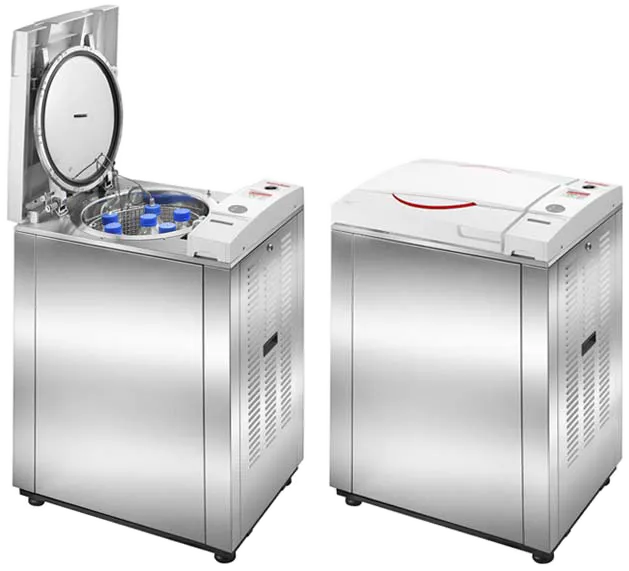Safe Coronavirus Research with Best-in-class Autoclaves, Fully Compatible with the WHO Guidelines
According to the WHO, “non-propagative diagnostic laboratory work (for example, sequencing, nucleic acid amplification test [NAAT]) should be conducted at a facility using procedures equivalent to Biosafety Level 2 (BSL-2). Propagative work (for example, virus culture, isolation, or neutralization assays) should be conducted at a containment laboratory with inward directional airflow (BSL-3)”. Tuttnauer’s laboratory autoclaves are designed to process biohazardous waste, culture media, and laboratory instruments, in compliance with the rigorous demands of BSL2 and BSL labs, including validation and precise documentation.
The Importance of Air-handling in a Biosafety Lab
Exhaust Air-handling systems are installed and maintained in laboratories, research institutes, and healthcare facilities to protect the facility and staff.Yet, not all autoclaves protect the environment from air released. Therefore, minimizing the risk for laboratory staff processing specimens from patients with possible or laboratory-confirmed COVID-19 should take into account autoclave air-handling and the optional HEPA filter in Tuttnauer’s advanced vertical and horizontal laboratory autoclaves.
Why Filter Air-Outlet When Running an Autoclave?
Air needs to be filtered when sterilizing lab instruments and biohazardous materials at pre-vacuum stage. Effluent air may contain infectious substances, potentially contaminated by toxins, viruses such as the novel Coronavirus, or medical waste. Therefore it is highly recommended to equip the autoclave with an advanced air filter.
Filters have intended uses in autoclaves for protecting the environment from potentially dangerous gasses released from the autoclave.
Tuttnauer’s vertical line of autoclaves is optionally equipped with a HEPA air filter that blocks microorganisms from exiting the chamber during the air removal phase. This protective measure prevents the contaminated air from escaping into the atmosphere and, instead, catches the harmful microorganism inside exhausting decontaminated air.

How Does it Work?
An autoclave sterilization cycle begins with air removal. The biohazard filter, which is located within the autoclave chamber, blocks dangerous microorganisms from exiting the autoclave chamber together with the air, thus keeping the lab safe. All effluent is passed through a 0.2 μm biological HEPA filter that filters the exhaust air. The biological filter is located within the autoclave chamber and is consequently sterilized during the cycle.
HEPA Filters treat the following loads:
• Biohazard solid loads at 134°C
• Biohazard liquid loads at 121°C
• Biohazard Waste Sterilization

The result:
The facility staff and environment receive an extra layer of protection against infectious agents with perfect sterilization results
About Tuttnauer
Tuttnauer provides end to end sterile processing solutions for laboratories, research institutes, hospitals, medical, dental and ophthalmic clinics, including; advanced autoclave sterilizers, washer-disinfectors, indicators, and sterile processing products. The safe and reliable biocontainment systems are designed to deal with the environmental threat posed by pathogens and other contaminated materials emitted from laboratories. Tuttnauer takes the most extreme measures in fighting bacteria and viruses, including the Coronavirus (aka SARS-CoV-2) and provide innovative decontamination solutions for Laboratories and research facilities that go above and beyond the required standards. Our highly advanced solutions prove their necessity at times like the Coronavirus pandemic.
For further information and to inquire about purchasing the advanced vertical autoclave with a HEPA filter for your laboratory, contact a Tuttnauer representative.